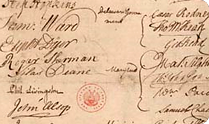Was the American Revolution Avoidable?
Tuesday, Oct. 19, 2010
7:00 p.m.–8:30 p.m. (EST)

Leader
Jack P. Greene
Andrew W. Mellon Professor in the Humanities, Emeritus
Johns Hopkins University
National Humanities Center Fellow
About the Seminar
What was the relationship between the colonies and Britain that led to independence in 1783? What if the British had not tried to tax the colonies? The taxes were small. Why did the colonies resist them so strongly? What if the British had responded to the resistance in a more conciliatory and pragmatic way? Could the controversy have been resolved so the colonies would have remained connected to Britain? What form might that connection have taken? What might have been the result of reconciliation? Would slavery have been abolished earlier? Would the colonies have developed into one or more commonwealths with autonomous internal governance, like Canada, Australia, New Zealand, and South Africa? What would be the relationship today between the United States and Britain?
Enter Moodle Forum
Assigned Readings
To incorporate seminar texts into your teaching, we offer the National Humanities Center’s Primary Document Application Form.- Texts from the forthcoming National Humanities Center toolbox Making the Revolution: America, 1763–1791.
- From Colonies to Nation, 1763–1789: A Documentary History of the American Revolution, Jack Greene, ed.
- From Prologue to Revolution: Sources and Documents on the Stamp Act Crisis, 1764–1766, Edmund Morgan, ed.
Presentation
PowerPoint: 2.9 MBOnline Evaluation
Seminar Recording
Download Recording (You will need to install the WebEx ARF player, available at download, to play back the recording.)
